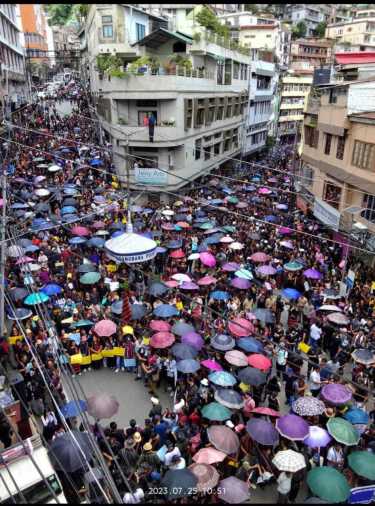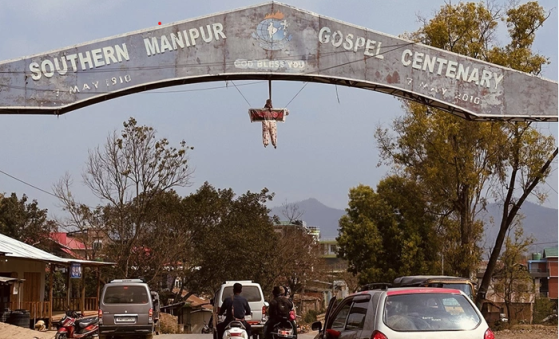
Manipur’s fragile peace initiative suffered a major blow over the past week as both Meitei and Kuki-Zo groups rejected key agreements announced by the Centre, casting doubt over efforts to restore normalcy in the strife-torn state ahead of Prime Minister Narendra Modi’s expected visit on September 13.
The Centre’s announcement on Wednesday, September 4 regarding two significant developments - the extension of the Suspension of Operations (SoO) agreement with Kuki-Zo militant groups and the reopening of National Highway-2 - met with strong opposition from civil society organisations representing both communities in the days that followed.
The Coordinating Committee on Manipur Integrity (COCOMI), one of the largest Meitei civil society groups in the state, strongly condemned the Centre’s decision to extend the SoO agreement with the Kuki National Organisation and United People’s Front on Thursday, September 5. The organisation termed the move a “deceptive and anti-people” decision that legitimised “Chin-Kuki armed narco-terrorist groups.”
“The decision to extend the SoO under such circumstances is illegitimate and reflects an undemocratic and hegemonic imposition upon the indigenous people and its elected representatives of Manipur,” COCOMI stated. The group argued that the decision undermined democratic principles, citing the popularly elected Manipur government’s Cabinet resolution of March 10, 2023, which unanimously decided to abrogate the SoO agreement, and a unanimous February 29, 2024 assembly vote to revoke the pact.
The controversy deepened when the Kuki-Zo Council itself issued a press clarification on Wednesday, September 4, the same day as the Centre’s announcement, stating categorically that “the Imphal-Dimapur NH-02 has never been closed or blocked” and that “the question of reopening does not arise, contrary to certain media reports.” The KZC clarified that their appeal was specifically confined to the Kangpokpi district stretch and “must not be misinterpreted as an endorsement of unrestricted or free movement across the buffer zones.”
The council emphasised that “the sanctity of the buffer zones between the Meitei and Kuki-Zo areas will continue to be strictly respected and maintained.” They clarified that their role was simply to urge people of Kangpokpi to cooperate with central security forces, stating it was “neither the duty of the local public in Kangpokpi nor of KZC to guarantee foolproof security for national highway users.”
COCOMI raised serious questions about the constitutional legitimacy of the agreements, noting that Manipur has been under President’s Rule since February 13, 2025, following N. Biren Singh’s resignation as Chief Minister on February 9. The organisation argued that the current administration, being appointed from New Delhi, “lacks the legitimacy to represent the people of Manipur in letter and spirit.”
The Meitei Heritage Society added to the criticism on Friday, September 6, describing the Ministry of Home Affairs’ September 4 statement as “misleading and contradicted by the official statement issued by the Chin Kuki militants.” The organisation expressed worry that the Centre’s narrative suggested that “the authority to open or close the national highways in Manipur lies with a private organisation and not with the Indian State.”
The Village Volunteers’ Coordinating Committee, an influential grassroots Kuki-Zo organisation, declared the reopening of the Imphal-Dimapur highway “null and void.” The committee stated that Meitei people remained unwelcome in Kuki-Zo territory, making any announcement regarding “free movement” on NH-2 meaningless. It reaffirmed that no free movement would be allowed to Meiteis in Kuki areas until their demand for separate administration was accepted.
The situation took another turn on Sunday, September 8 when the KNO and UPF accused the Press Information Bureau, the government’s official information arm, of spinning information about their agreement. In a statement issued on Saturday, September 7, the groups said PIB’s misinterpretation had “seriously upset Kuki Zo sentiment” and negatively affected the mood over Prime Minister Modi’s proposed visit to Churachandpur on September 13.
The groups pointed to a discrepancy between the official agreement and PIB’s presentation. According to their statement, the SoO agreement clearly states that it “shall be followed by a tripartite dialogue with KNO and UPF to pave the way for a negotiated political settlement under the Constitution of India in a time-bound manner.” However, PIB presented this as “need for a negotiated solution to bring peace and stability to the State of Manipur.”
“This twist by PIB does not figure anywhere in the SoO agreement signed between the MHA and the SoO group,” the statement said, adding that this had “caused confusion among the people.”
More significantly, the KNO and UPF revealed that their demands had escalated since the ethnic violence began. The groups stated that before May 3, 2023, when violence erupted in the state, their demand was only for local autonomy via a Territorial Council within Manipur. However, following the violence, they now demand a union territory with legislature for Kuki-Zo areas. This demand was formally presented at a SoO meeting held on September 1, 2023.
On Thursday, September 5, the KNO and UPF had issued their own statement titled “Path to Peace and Constitutional Integrity: Tripartite Dialogue to Follow Suspension of Operations Agreement,” emphasising their commitment to “a negotiated political settlement under the Constitution of India.” The statement underscored that “any territorial integrity or unilateral administrative assertions by a particular state to alter boundaries within the Indian Constitution provides a clear framework under Articles 1, 3, and 368 for any territorial reconfiguration, which must be initiated and ratified by Parliament.”
The KZC, in its official clarification, also warmly welcomed the Centre’s decision to extend the SoO agreement with KNO and UPF, expressing hope that “the Government of India will follow this up by resuming the political dialogue for a Separate Administration under the Constitution of India, which alone can bring lasting peace and prosperity to the Kuki-Zo people.”
The Village Volunteers’ Coordinating Committee notably stated that the groups which signed the SoO were not mandated representatives of Kukis, though they did not oppose the decision to sign the agreement itself.
The rejections have exposed significant cracks in the peace process just days before the Prime Minister’s anticipated first visit to Manipur since ethnic violence erupted on May 3, 2023. The conflict has resulted in approximately 250 deaths and displaced more than 60,000 people from their homes.
Meanwhile, BJP legislator from Imphal West Y. Khemchand Singh welcomed the highway reopening announcement, calling it “a substantial milestone in the restoration of normalcy.” He appealed to all citizens “to put aside past differences and work collectively towards building a progressive and inclusive Manipur like before.”
The political situation remains complex, with the BJP holding an absolute majority in the 60-member House but not staking claim to form the government under President’s Rule. The Congress party has repeatedly called for fresh elections in the state.
The MHS warned that the “misleading” press statement by the MHA might give false understanding to the Meitei public about highway safety, potentially putting them at risk. The organisation requested the Ministry of Home Affairs to clarify the press release “in the interest of public safety and ensure the safety of Meitei travellers.”
Both communities have rejected the Centre’s peace initiatives ahead of the Prime Minister’s first planned visit to the state since violence began in May 2023.




